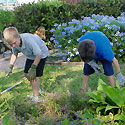Garden Safety with Kids
Gardening is a great way to introduce kids to the world around them. But remember, things that you think are perfectly safe can be very dangerous for a child. Look at the world from your child's point of view for potential hazards.
Before letting kids garden, review these helpful safety tips:
Helpful Tips
Don't Let Kids Wander
- Never leave a toddler or young child outdoors unattended.
- Make sure there is no access to the street or driveway from the children’s play area.
- Fences are a good way to help keep a wandering young one in bounds. These are especially important on stairs or decks to prevent falls. Also, keep deck furniture away from all railings of raised decks or balconies, since children can climb onto the furniture and over the rails.
Watch for Poisonous or Harmful Plants
- Teach kids never to eat any plant unless an adult is supervising. While eating fruits and vegetables you’ve grown yourself is part of the joy of gardening, many common ornamental plants can make you sick if you eat them, and some are very poisonous. A free list of common poisonous plants is available from your county Extension office.
- Make sure that poison ivy is not allowed to grow in your landscape. Watch for this vine with three-part leaves and immediately eliminate any you find.
- Check for plants with spiny leaves or thorns, such as cacti, roses, yucca, hollies, or pyracantha. Do not plant spiny plants next to raised porches, decks, or steps where children might fall into them.
- Point out any potential hazards to children and fence off areas or plants that should be avoided. Remove dangerous plants, if necessary - especially if they are close to a play area.
Limit Use of Tools Around Kids
- Be careful with sharp tools and discuss with your children which tools are safe for them to use and which are not.
- When you lay down tools between use, place forks, rakes, and other pointed tools tines-down. If kids are around, keep your eye on the tools you put down when you are not using them - or put them away promptly when they're no longer needed.
- Don’t use a power lawn mower when children are in the yard, even if they are well away from you. Mowers can throw objects considerable distances with great force.
- Use stakes taller than your toddlers for plants that need support. Short stakes can cause eye injuries to kids.
- It’s a good idea to purchase tools specially made for children and properly sized for them to use. This gives them a chance to identify more closely with gardening, since they have their own tools.
Use Caution with Chemicals or Toxins
- Store pesticides in locked cabinets, in their original containers. This includes organic pesticides, some of which are quite toxic.
- Never use empty food or drink containers for storing pesticides, cleaning supplies, or fertilizers!
- Don't leave pesticide containers out while using them. Put them up promptly in a safe location after you have mixed the material.
- Children should never be around while pesticides are being mixed or applied.
- Do not allow children to eat soil from the garden. Some soils may contain relatively high amounts of lead or other toxic substances and should not be consumed.
- Store the gas tanks for propane grills where children can't reach the knobs.
Water Is Dangerous!
- Be especially watchful of young children around ponds, pools, large puddles, buckets and large containers of any sort. Small children can drown in even small amounts of water.
- Fence off ponds or other aquatic features if necessary.
Keep an Eye Out for Pests
- Most insects in the garden are harmless. Even insects that can sting, such as bees and wasps, generally will not be a problem if they are left alone.
- Control any fire ant hills in the area where children are likely to play or garden.
- Be familiar with the stinging caterpillars that occur in our state.
Wash Your Hands!
- Remember, after you and your kids finish in the garden, to always wash everyone's hands and to use antiseptics on cuts or scrapes.

